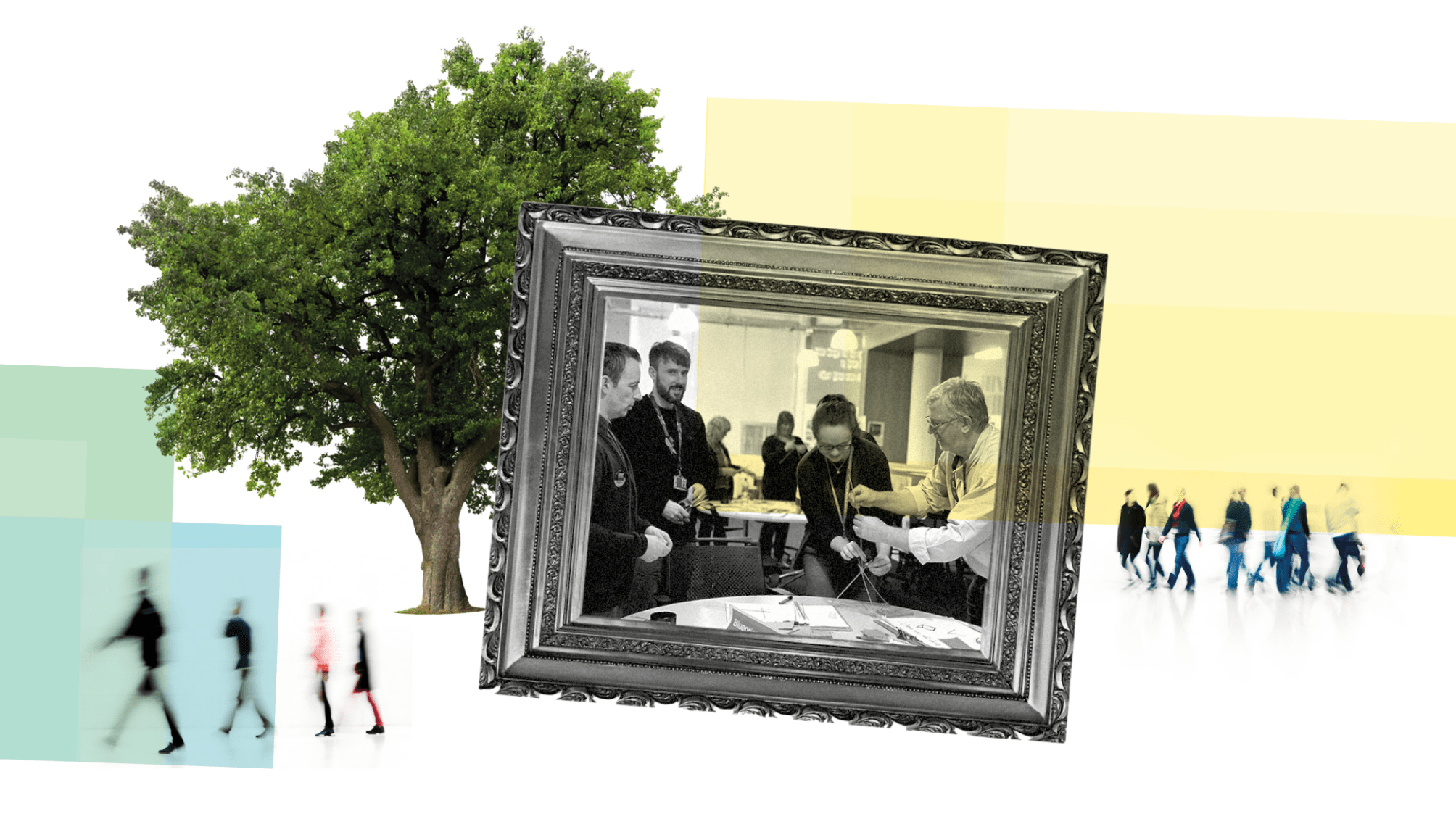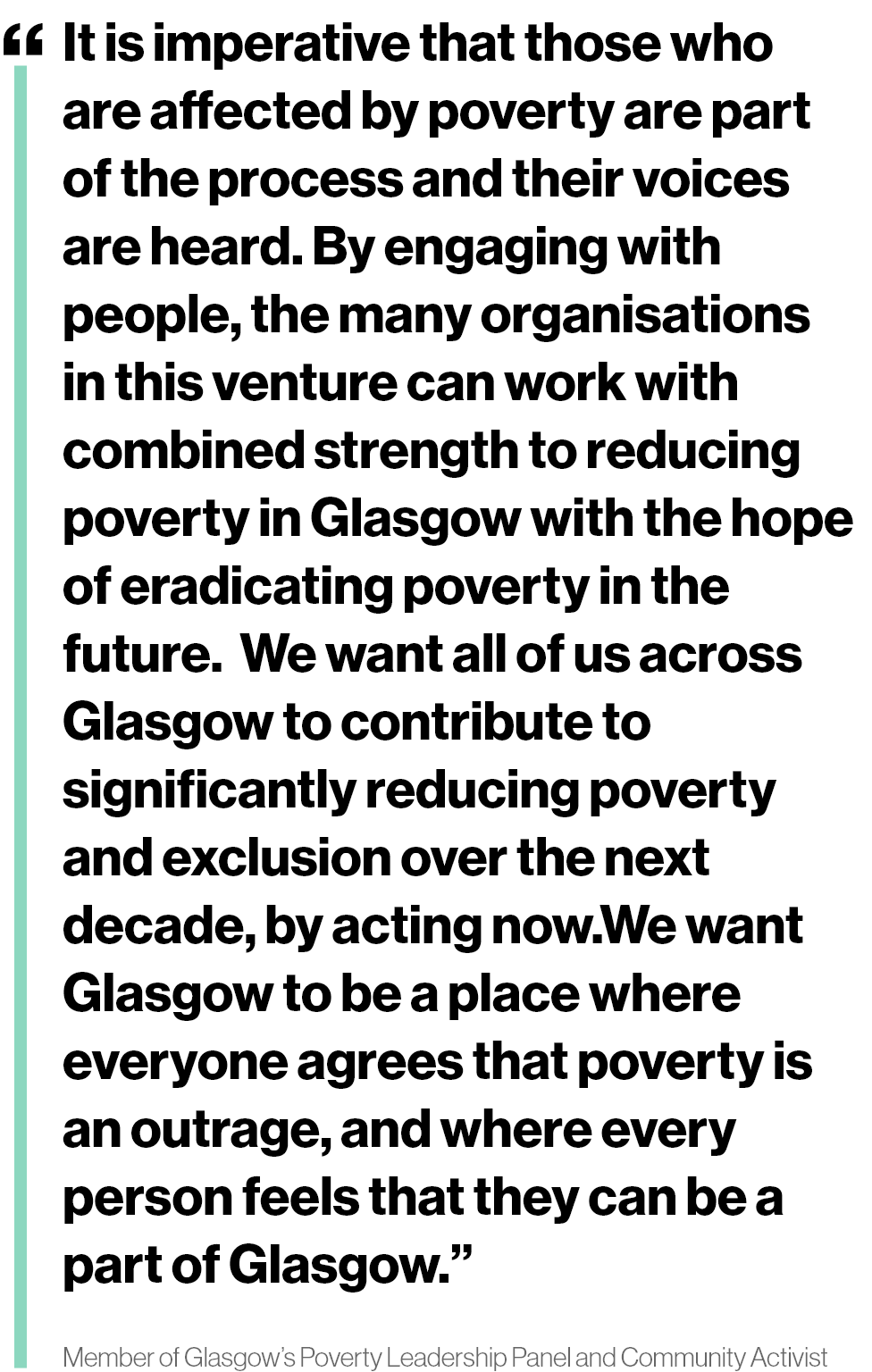Creating a network of citizen designers for Glasgow
The array of design approaches and methodologies employed by the CCI and our world leading network of solvers has never been more relevant. By embedding these same skills and methodologies in our communities we believe we can empower our neighbourhoods to co-design the solutions to the challenges they face, both locally and across the city.

Our citizens are at the heart of everything we do. The influence and impact of design within contemporary society is evolving and transforming. It explores the future, generates new knowledge and formulates ideas about how people may live or work in the years to come. Creating an understanding for the short, mid and longer term enables designers to make an informed response to changes happening now, whilst simultaneously considering where to move next, and in turn, build a vision for the future.
Success will be incremental as we create a new design led infrastructure in the city.
Our evaluation work will be based on a citizen-led model for evaluating design interventions in the City.
In the short term, having a strong cohort of citizens engaged in the design of the programme and a strong partnership moving forward will be evidence of initial success.
Future success will see higher citizen satisfaction levels in services delivered because we are designing with them. Fewer complaints, higher levels of trust and pride in the city.
Better decision making both locally and at city level with a suite of indicators to support that.
Creating a network of citizen designers throughout the city linked to sustainable employment and opportunities. We will measure how this contributes to inclusive economic growth - upskilled citizens accessing the jobs of the future.
Through our activities we will measure success by the number of devolved services and budgets that have been implemented in neighbourhoods and the number of nature based social enterprises created.
Fundamentally, the cumulative effect of this will reduce the level of poverty in the city. We will have successfully mitigated the effects of the pandemic by upskilling and future-proofing our citizens.
We believe this can be a prototype for a socially innovative city of tomorrow where design and innovation skills are the cornerstone of our local and global communities. A city where the needs of our people are at the heart of everything we do.

.png)
We are inspiring and engaging the citizens of Glasgow to create a better future for everybody
We want to embed design, data and innovation methodology in every community hub in the city, empowering communities to solve problems, share knowledge and develop an inclusive network of accessible and revitalised neighbourhoods designed for the benefit of all.
Social Innovation for the Common Good
In line with the Scottish Government’s commitment to design, upscaling our design-led approach is central to our ambitions to be greener, fairer and more equal, supporting innovation across sectors, developing critical, curious and inquiring minds, and addressing complex challenges.
Creative Community Hub Development
We embed design thinkers who will support the local residents to solve problems, share knowledge and co-create the services and placemaking projects in their area as part of the Creative Community Hub. This work will enable an inclusive network of accessible and revitalised neighbourhoods designed for the benefit of all.
Greater Pollok Design School
Asking local residents to design Greater Pollok NOW(Stage One) and Greater Pollok AFTER THE PANDEMIC (Stage Two). The project provides some simple and easy to follow design briefs, which were developed with citizens from across Greater Pollok, that will let you contribute ideas and suggestions in a fun and creative way.
This project is led by the After the Pandemic team in collaboration with the Centre for Civic Innovation, Greater Pollok Artists in Residence and Colour Ways.
Understanding Greater Pollok
A research programme working with local citizens, groups and organisations to understand the area in greater detail. To influence and back up decisions that are made around next steps with the longer term view is that this can be used by partners to deliver fit for purpose services.
The project will aim to make better use of design and placemaking skills and take advantage of data sharing opportunities and networks that facilitate a more targetted and effective way of designing local neighbourhoods.
Nature Based Accelerator Programme
The Nature-Based Accelerator is a pilot programme has been developed to support early-stage impactful nature-based business and social enterprise that could make a positive environmental, social, and economic change in Glasgow.
The programme aims to encourage more local and resilient nature-based economies, create more green jobs, and help us achieve our net-zero targets. One of the main focuses of the pilot is on how we can use innovative enterprise ideas to help improve and maintain Glasgow’s open spaces.
Neighbourhood Design Academy
We are co-designing a community designed education hub that builds capacity within citizens and the community and creates “citizen designers”. A unique curriculum of community up-skilling and accredited qualifications to empower citizens to design, test and build their communities of the future.
A graduate programme will create links to employment - impacting on inclusive growth targets and building capacity across the city in the new skills we require to create a design led city working for the common good with it’s citizens at the heart of everything it does.
Storytelling for Impact: evaluation toolkit
Exploring a rationale for developing a citizen-led model for evaluating design interventions in the community. This will be explored by a regional and national partnership with V&A Dundee, Glasgow City Council, Dundee City Council and DJCAD, University of Dundee.
If successful, this study will make recommendations for collating future evidence to accelerate regional growth and create models that can be passed on to other regions and cities.
Collaborative Futures
In the Post Covid-19 world, the council needs to plan for the socio-economic challenges ahead, and ensure services are developed with, rather than for, citizens, their communities and the places they inhabit, to ensure they are fit for the 21st century.
So, what might a more porous, participatory future Glasgow look like in 2030, who might the citizens who inhabit it be? Where, and how, do their lives play out – how does design, data and innovation influence, involve and empower them and what might they need in terms of future products, services and experiences, and why?